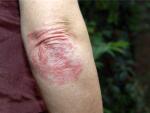What to Know About Biologics for Psoriasis

Medically Reviewed By William C. Lloyd III, MD, FACS
Written By Jane Soung on August 21, 2021
-
 There are newer treatment options for psoriasis.One of the newer treatments for moderate to severe psoriasis and psoriatic arthritis is a group of medications known as biologics. Biologics are made from proteins produced by living cells in a laboratory. Here's what you should know about these medications and how they may be able to help your psoriasis.
There are newer treatment options for psoriasis.One of the newer treatments for moderate to severe psoriasis and psoriatic arthritis is a group of medications known as biologics. Biologics are made from proteins produced by living cells in a laboratory. Here's what you should know about these medications and how they may be able to help your psoriasis. -
 Understand how biologics works.Unlike systemic drugs that affect your entire immune system, biologics target specific parts of your immune system. Psoriatic biologics block a type of immune cell called a T cell or certain proteins, such as TNF-alpha or interleukins 12 and 23. These cells and proteins lead to the inflammation and overproduction of skin cells seen in psoriasis.
Understand how biologics works.Unlike systemic drugs that affect your entire immune system, biologics target specific parts of your immune system. Psoriatic biologics block a type of immune cell called a T cell or certain proteins, such as TNF-alpha or interleukins 12 and 23. These cells and proteins lead to the inflammation and overproduction of skin cells seen in psoriasis. -
-
 There are several biologic options available.Enbrel (etanercept), Humira (adalimumab), Remicade (infliximab), and Simponi (golimumab) are psoriatic drugs that block TNF-alpha. Stelara (ustekinumab) is a biologic that targets and blocks inflammation-producing interleukin 12 and interleukin 23. Cosentyx (secukinumab) and Taltz (Ixekizumab) block interleukin-17A. Otezla (apremilast) blocks the PDE4 enzyme to control inflammation.
There are several biologic options available.Enbrel (etanercept), Humira (adalimumab), Remicade (infliximab), and Simponi (golimumab) are psoriatic drugs that block TNF-alpha. Stelara (ustekinumab) is a biologic that targets and blocks inflammation-producing interleukin 12 and interleukin 23. Cosentyx (secukinumab) and Taltz (Ixekizumab) block interleukin-17A. Otezla (apremilast) blocks the PDE4 enzyme to control inflammation. -
 Biologics are meant for tougher cases of psoriasis.Biologics are best for moderate to severe plaque psoriasis or psoriatic arthritis. Your doctor may also consider biologics if your psoriasis hasn't responded well to other treatments or if you're having bad side effects from other drugs. TNF-alpha blockers can even help slow the joint damage of psoriatic arthritis.
Biologics are meant for tougher cases of psoriasis.Biologics are best for moderate to severe plaque psoriasis or psoriatic arthritis. Your doctor may also consider biologics if your psoriasis hasn't responded well to other treatments or if you're having bad side effects from other drugs. TNF-alpha blockers can even help slow the joint damage of psoriatic arthritis. -
 Biologics are given by injection or pill.Most biologics for the treatment of psoriasis are taken by injection or by intravenous (IV) infusion. Some injections can be given by yourself or a family member, while others may need to be administered by a health care provider at a doctor's office or infusion center. A twice-daily oral tablet called Otezla (apremilast) is FDA-approved for treatment of plaque psoriasis.
Biologics are given by injection or pill.Most biologics for the treatment of psoriasis are taken by injection or by intravenous (IV) infusion. Some injections can be given by yourself or a family member, while others may need to be administered by a health care provider at a doctor's office or infusion center. A twice-daily oral tablet called Otezla (apremilast) is FDA-approved for treatment of plaque psoriasis. -
 The results may vary.How well biologics work for your psoriasis will vary from person to person. Results also depend on the specific medication and dose you're on. Remicade (infliximab) and Humira (adalimumab) tend to work more quickly. You may notice improvement within two weeks. Other biologics, like Enbrel (etanercept), may take four to eight weeks.
The results may vary.How well biologics work for your psoriasis will vary from person to person. Results also depend on the specific medication and dose you're on. Remicade (infliximab) and Humira (adalimumab) tend to work more quickly. You may notice improvement within two weeks. Other biologics, like Enbrel (etanercept), may take four to eight weeks. -
-
 Get to know the common side effects.It's important to discuss possible side effects with your doctor before starting any new medication. Biologics can increase your risk of infection. The most common side effects include respiratory infections, injection site reactions, and flu-like symptoms. Contact your doctor right away if you have fever or cough, or if you notice swelling or a rash around your injection site.
Get to know the common side effects.It's important to discuss possible side effects with your doctor before starting any new medication. Biologics can increase your risk of infection. The most common side effects include respiratory infections, injection site reactions, and flu-like symptoms. Contact your doctor right away if you have fever or cough, or if you notice swelling or a rash around your injection site. -
 Be aware of the cancer concern.There has been some concern about a possible rare side effect of TNF-alpha blocking medications: an increased risk of lymphoma, which is a type of cancer. The U.S. Food and Drug Administration has concluded there isn't enough data right now to know if these drugs increase risk of lymphoma in people with psoriasis.
Be aware of the cancer concern.There has been some concern about a possible rare side effect of TNF-alpha blocking medications: an increased risk of lymphoma, which is a type of cancer. The U.S. Food and Drug Administration has concluded there isn't enough data right now to know if these drugs increase risk of lymphoma in people with psoriasis. -
 Know the costs of biologics.Biologics are costly to research and produce, which makes them expensive medications. Pricing for psoriasis biologics varies widely. In a 2014 report, prices ranged from $6,000 to $54,000 a year. Voluntary enrollment in a psoriasis treatment clinical trial may eliminate the cost of treatment during the course of the study.
Know the costs of biologics.Biologics are costly to research and produce, which makes them expensive medications. Pricing for psoriasis biologics varies widely. In a 2014 report, prices ranged from $6,000 to $54,000 a year. Voluntary enrollment in a psoriasis treatment clinical trial may eliminate the cost of treatment during the course of the study. -
 See if combination treatment is right for you.There are many approaches to treating psoriasis. All the biologics currently available can be combined with other treatments such as phototherapy or topical medications. Talk with your doctor about whether using other treatments along with a biologic is right for your psoriasis.
See if combination treatment is right for you.There are many approaches to treating psoriasis. All the biologics currently available can be combined with other treatments such as phototherapy or topical medications. Talk with your doctor about whether using other treatments along with a biologic is right for your psoriasis.
What to Know About Biologics for Psoriasis





































